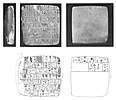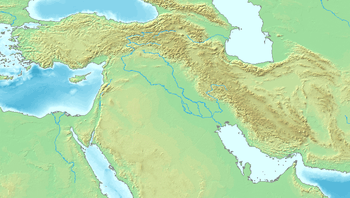En-hegal
En-hegal, also Enhengal (Sumerian: 𒂗𒃶𒅅, en-ḫe₂-ŋal₂), was an ancient ruler of the Sumerian city-state of Lagash. Only one inscription mentioning him is known, the "Tablet of En-hegal", describing a business transaction.[1][2] It is estimated that he ruled circa 2570 BCE.[3][4]
| En-hegal | |
|---|---|
| King of Lagash | |
.jpg) Inscription For En-hegal, King of Lagash (𒂗𒃶𒅅 𒈗𒂠 𒉢𒁓𒆷), in the Tablet of En-hegal | |
| Reign | c. 2570 BCE |
| Successor | Lugalshaengur |
| Dynasty | 1st dynasty of Lagash |
It is thought that En-hegal was a predecessor of Ur-Nanshe. The tablet describes a business transaction, in which King En-hegal buys land.[5] He seems to have purchased about 1,000 hectares of land.[6] A tentative translation of the tablet was published by George A. Barton.[1]
 The Tablet of En-hegal records major land transcations by King En-hegal.[1]
The Tablet of En-hegal records major land transcations by King En-hegal.[1].jpg)
See also
References
- Barton, George A. (1915). Sumerian Business and Administrative Documents. Philadelphia University. p. 9, see also plates.
- "Cuneiform Digital Library Initiative".
- "The inscription by an ensi called Enhegal dates from the Early Dynastic period IH, around 2570 BC." in Leick, Gwendolyn (2009). Historical Dictionary of Mesopotamia. Scarecrow Press. p. 102. ISBN 978-0-8108-6324-8.
- Silver, Morris (1995). Economic Structures of Antiquity. Greenwood Publishing Group. p. 182. ISBN 978-0-313-29380-1.
- Kramer, Samuel Noah (1971). The Sumerians: Their History, Culture, and Character. University of Chicago Press. p. 75. ISBN 978-0-226-45238-8.
- Adams, Robert McCormick. The Evolution of Urban Society: Early Mesopotamia and Prehispanic Mexico. Transaction Publishers. p. 106. ISBN 978-0-202-36594-7.
Bibliography
- Vojtech Zamarovský, Na počiatku bol Sumer, Mladé letá, 1968 Bratislava
- Plamen Rusev, Mesalim, Lugal Na Kish: Politicheska Istoriia Na Ranen Shumer (XXVIII-XXVI V. Pr. N. E.), Faber, 2001 (LanguageBulgarian) [(Mesalim, Lugal of Kish. Political History of Early Sumer (XXVIII–XXVI century BC.)]
| Regnal titles | ||
|---|---|---|
| Preceded by --- |
King of Lagash ca. 25th century BCE |
Succeeded by Lugalshaengur |
This article is issued from Wikipedia. The text is licensed under Creative Commons - Attribution - Sharealike. Additional terms may apply for the media files.
